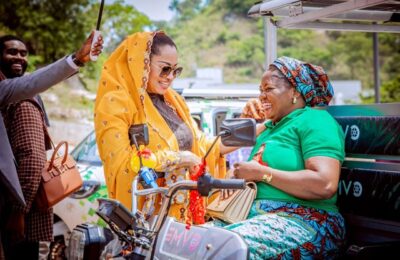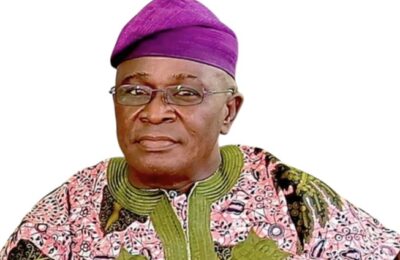He held various portfolios at different times as commissioner in Kogi State between 1999 and 2003. Senator Nicholas Ugbane later contested for the Senate twice and twice he won, but know he is an aspirant for the gubernatorial position on the platform of the All Progressives Congress (APC). In this interview with Ayodele Adesanmi, he states the reasons why he is contesting, among others.
Are you not afraid of the growing number of aspirants in the gubernatorial election in Kogi State and besides, what are your own selling points?
I have gone through at least 75 percent of the local council areas in the state and in doing so, I have equally met with all the party executives in the council areas in the state. I have met party chairmen at the local level, the ward chairmen, women leaders, secretaries and the youth leaders and through my interaction with them, the message was clear. The message was on the basis of what I would do for them if I become the governor of Kogi State. By the special grace of God, going by the consultation which I have carried out, the meetings with the people and delegates, their reactions and assurances, my chances are very, very bright. My campaign organisation has accessed and analysed the outcome of the consultations and I was informed that we are firmly in the race. Based on this, by the grace of God, my chances are very, very bright.
There have been agitations for power shift in the state, what is your reaction to it?
The issue of power shift is an issue that has been existing in Kogi State for long. Now, what the All Progressives Congress should do as a party is to put its acts together and make sure power is wrested from the Peoples Democratic Party. It is when power is wrested from the PDP that we can now decide where power should shift to. I said this because I believe I’m in the position to wrest power from PDP and after that we would now decide where the power goes to. That will be determined by the party caucus. Power shifting is not done by an individual. Now, I think everybody should rally round me to become the candidate and eventually become the governor of Kogi State.
But why did you choose this time to contest the governorship?
This is not the first time I’m coming out for the governorship race as you are aware that in 2011, I came out, under the PDP, to contest but unfortunately, it was on the eve of the primary that we had a subterranean influence. Influence in the sense that a level playing field had been created and then something extraneous emerged somewhere to alter the equation, then you regard such situation as subterranean and because of that, I had to withdraw voluntarily from going into that primary because it would not be free and fair after all. This time around, the same thing that prompted me to come out in 2011 has brought me forward again; that innate desire to serve the people of Kogi State, to offer my services to the people of Kogi State, to do things that will improve their lot, to do things that will give them a sense of belonging and make them feel that, yes, they are from Kogi State. I will do those things that will improve and help the state in terms of infrastructural and socio-economic development, among others. So, those burning desires have always been with me and I am now ready to actualise them for the benefit of the people.
Federal allocations to the states are on the downward slide, how do you intend to manage the affairs of the state in view of this if you eventually become governor?
The strategy I would employ would amaze you but it is not only Kogi that is experiencing the dwindling revenue from the Federal Government. However when we get to the river, we will cross it and I know that as a former banker with knowledge in prudent financial management, I will make sure financial resources accruing to the state are properly managed for the benefit of the people of Kogi.
When you were in the Senate, you had some issues with the Economic and Financial Crimes Commission (EFCC), how far have you gone with the case?
In a typical political setting, allegations are bound to be flying up and down, but it is left for you to clarify your position. It is a basic principle in law that he who alleges must prove his case beyond reasonable doubt and until that is proved, you are assumed to be innocent. Now, the case they brought was that some of us legislators influenced the siting of solar projects in the entire country; that we brought the contractor that did the work and so on. There were lots of fanfare and mudslinging in the process. Now, the case went to court and on 26 June, 2013, Justice Oniyangi gave a very great judgement. He said he couldn’t see the link between the allegation and the lawmakers, that the lawmakers were not part of Tenders Board that gave out the contract. And that he did not see any company owned by any of the lawmaker, he didn’t see their involvement and so he struck out the case. I have a copy of the judgement and if you are interested, I will give it to you at the appropriate time.
Do you believe the recent happenings at the National Assembly speak well of your party which has the majority in both chambers?
Well, I don’t know those things you have noticed that are happening at the National Assembly. I think you are referring to the fracas that took place in the House of Representatives and so on. Well, you see somebody referred to that fracas as body politic. In other words some people that are so impatient who cannot wait to express their feelings sometimes allow temperament to take over the proceedings and that is not fair. Having said that, what happened in the National Assembly was not new to politics. In Taiwan and other places, in North Korea, lawmakers exchange blows. Those things happen from time to time. Even in Britain, there was a time there were hot arguments, the Labour Party members and other parliamentarians had a hot exchange of words, though it is not something that should be encouraged, it shouldn’t happen. What is required is legislative tolerance, having understanding of each other. I think we are growing, our democracy is moving and I hope with time we will get things sorted out properly.
You headed various offices in the state in the past, specifically as commissioner for education, commerce, agriculture and youth development, which area would you want to focus more on if eventually you are given the opportunity to govern the state?
Let me pick it up from when I was the commissioner for education. I was then the foundation commissioner that established the Kogi State University, got the vice chancellor in position and the first set of admissions and so on. I’m happy today that the institution is growing and waxing stronger. Now if I become the governor, the state university will be adequately catered for. I will make sure lecturers are well motivated, students are encouraged by having adequate facilities to enable them to concentrate on their studies. We will provide facilities that will make them compete favourably with students from other tertiary institutions. Secondly, education generally, it is not only the university, you also have the primary education and other institutions. We will make sure teachers are given their dues. We will make sure their salaries are paid as and when due. We’ll make sure that teachers are encouraged to give their best to students. So that will form very key area of our priority. You said from education to agriculture, you are taking me through a marathon race of the ministries I have worked. Yes, I worked in the ministry of youth and sports, in fact, it was during my time that the youth and sports ministry was established and when I was there, there were no desks and chairs, it was a business man from central senatorial district that brought a chair for me. That didn’t deter me from performing. I was there and we conceptualised the stadium project because all work without play makes Jack a dull boy. So the stadium project has seen the light of day. From there again, I was moved to the ministry of commerce and industry. I had to follow the then governor to the UK to discuss about Obajana Cement Company and that was done. Now you can see that Obajana Cement Company is one of the biggest in sub-Sahara Africa. From there, I came to the ministry of agriculture and made sure that farmers got input promptly and on time. For instance, there is no point getting fertilisers in August when most of the crops must have been grown, so time is very important. Apart from that, we removed the middlemen coming in to hike prices of inputs and in the end make it very costly to the end users, the farmers. When I become governor, I will look into all these areas and improve upon them. I am coming to bring added value to existing things and that is that.
One of the aspirants said he is the only serious contender on the APC platform and that the rest are just pretenders and jokers, what would you say about that ?
That is a vey technical and tricky question. I don’t want to join issues with other aspirants. Who is a joker or who is not a joker will be determined by the electorate. The delegates will speak and when they speak, we will know.




